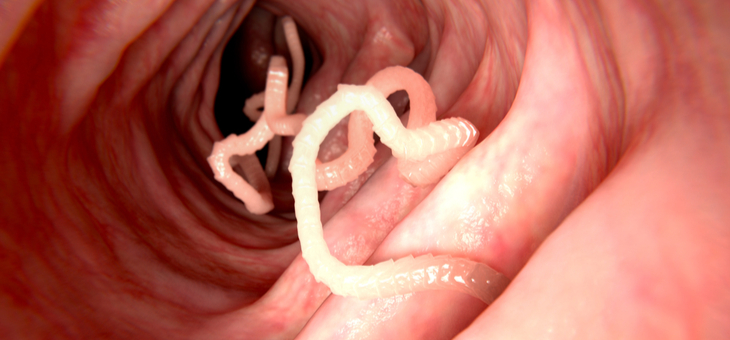Parasites are organisms that live on or inside an organism belonging to another species. While non-pathogenic parasites may cause only mild illness, pathogenic parasites can cause serious harm.
According to Vincent Ho, senior lecturer and clinical academic gastroenterologist from Western Sydney University, there are three main types of parasites. Ectoparasites, such as mites and lice, will live on or burrow into your skin. Protozoa and helminths mostly live in the gut and may be either non-pathogenic or pathogenic.
Helminths
These multicellular organisms are usually large enough to be seen by the naked eye. Common types of helminths that effect humans are worms, including roundworms and tapeworms.
The dwarf tapeworm affects about 55 per cent of people living in communities in north-west Australia. Symptoms include abdominal pain, weight loss, diarrhoea and general weakness.
Nematodes, also known as roundworms, will affect approximately 50 per cent of the world’s population at some stage in their life. They are the most common multicellular animal on the planet and their eggs are often passed through soil.
Protozoa
While there are many non-harmful types of protozoa, some can be deadly. Plasmodium, a species of protozoa, is passed from mosquitos to humans. It breaks down red blood cells, impairing organ function and causing malaria. In 2017, malaria caused 435,000 deaths according to the World Health Organisation, making protozoa the most deadly parasite.
Giardia, a different type or protozoa, cause cysts in the bowels. This parasite is often transmitted through faeces-contaminated food and water, and symptoms include abdominal cramps, fatigue, chronic diarrhoea and weight loss.
Ectoparasites
Lice, mites, ticks and fleas are all types of ectoparasites. The human itch mite, also known as scabies, is a transmitted through skin-to-skin contact and appears as small, itchy red spots on the skin.
Most parasites are easily treated with medical assistance. To prevent the spread of parasites, it’s important to regularly wash your hands and feet, wear shoes and maintain or improve sanitation quality.
Have you had a run-in with a parasite? Was your health professional easily able to identify it?
If you enjoy our content, don’t keep it to yourself. Share our free eNews with your friends and encourage them to sign up.
Related articles:
Health condition of most concern
Health benefits of eating eggs
Retirement health checklist
Disclaimer: This article contains general information about health issues and is not advice. For health advice, consult your medical practitioner.

